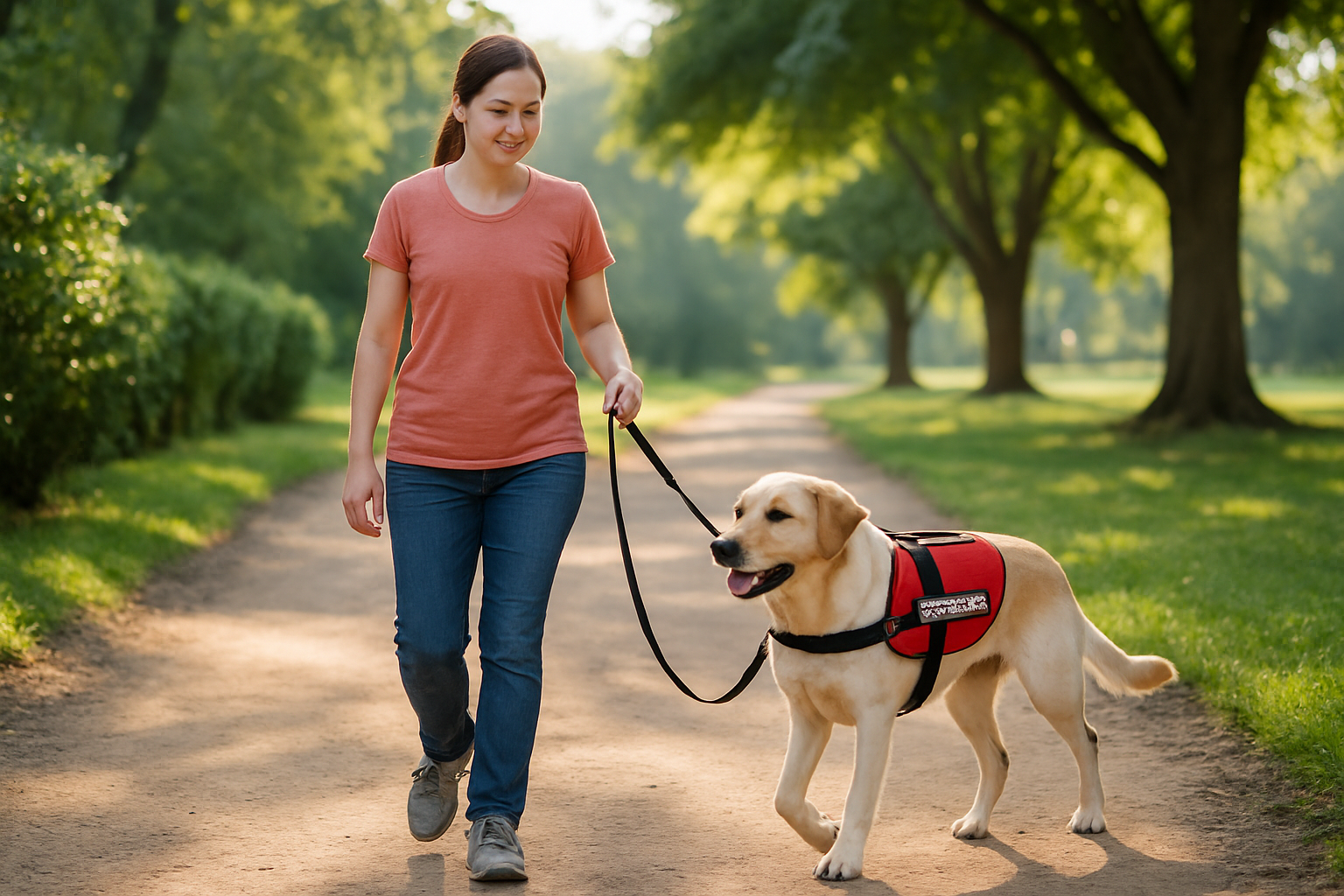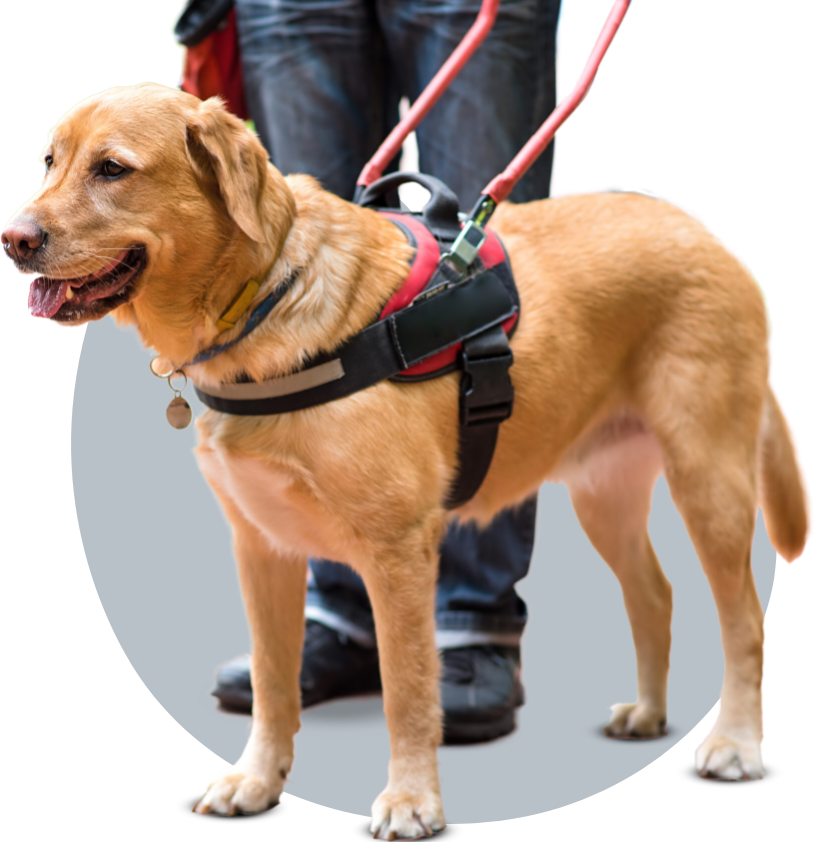How Service Dogs Assist with Chronic Illness

Living with a chronic illness presents daily challenges, from mobility limitations to unpredictable symptoms. For many individuals, service dogs offer not just companionship but also life-changing assistance. These highly trained animals help mitigate the effects of various medical conditions, enabling their handlers to lead more independent and fulfilling lives.
In this guide, we’ll explore how service dogs assist people with chronic illnesses, the different types of support they provide, legal protections, and how to qualify for one.
What Are Service Dogs?
Service dogs are specially trained canines that perform specific tasks to assist individuals with disabilities. Under the Americans with Disabilities Act (ADA), a service dog is defined as a dog that is individually trained to do work or perform tasks for a person with a disability. Unlike emotional support animals (ESAs) or therapy dogs, service dogs undergo rigorous training to meet their handler’s unique medical needs.
How Are They Different from Emotional Support Animals?
While emotional support animals (ESAs) provide comfort and emotional stability, they do not have the same legal rights as service dogs. Service dogs are granted public access rights, meaning they can accompany their handler in restaurants, stores, public transportation, and other spaces where pets are not typically allowed.
How Service Dogs Assist with Chronic Illnesses
Service dogs provide assistance in various ways, depending on their handler’s condition. Below are some of the most common types of support they offer.
1. Medical Alert and Response
Many chronic illnesses involve sudden medical episodes, and service dogs can be trained to detect and respond to these situations:
- Diabetes: Alert handlers to dangerous blood sugar fluctuations by sensing changes in scent.
- Seizures (Epilepsy): Recognize the signs of an oncoming seizure and help prevent injuries by providing physical support or retrieving medication.
- POTS (Postural Orthostatic Tachycardia Syndrome): Alert to changes in heart rate or blood pressure and assist with grounding during dizziness episodes.
2. Mobility Assistance
People with conditions that affect mobility, such as multiple sclerosis, arthritis, or muscular dystrophy, can benefit from service dogs trained to:
- Retrieve dropped items
- Open doors and push buttons
- Provide stability while walking
- Assist with transfers (e.g., from a wheelchair to a bed)
3. Psychiatric Support
Chronic illness often comes with mental health challenges, such as anxiety and depression. Psychiatric service dogs help by:
- Interrupting panic attacks or anxiety episodes
- Providing deep pressure therapy to reduce stress
- Creating a barrier in crowded spaces to prevent sensory overload
4. Allergy Detection
For individuals with severe allergies, service dogs can be trained to detect allergens such as peanuts, shellfish, or gluten. This can be life-saving for those with anaphylactic reactions.
5. Hearing and Vision Assistance
People with vision or hearing impairments caused by chronic conditions like diabetes or autoimmune disorders can rely on service dogs to:
- Alert them to sounds like alarms, doorbells, or approaching vehicles
- Guide them through obstacles safely
Legal Rights and Protections for Service Dog Handlers
Understanding the legal framework surrounding service dogs ensures that individuals with chronic illnesses can confidently access their rights.
Americans with Disabilities Act (ADA)
- Grants service dogs full public access rights.
- Businesses cannot ask for documentation or certification but may ask two questions:
- Is the dog a service animal required because of a disability?
- What tasks has the dog been trained to perform?
Fair Housing Act (FHA)
- Landlords must accommodate service dogs, even in pet-restricted housing.
- Read more at Housing and Urban Development (HUD).
Air Carrier Access Act (ACAA)
- Allows service dogs to fly in the cabin with their handler.
- Read more at Department of Transportation (DOT).
How to Qualify for a Service Dog
If you have a chronic illness and believe a service dog could improve your quality of life, here are the steps to take:
1. Determine Your Eligibility
- You must have a diagnosed disability that significantly impacts daily life.
- The service dog must be trained to perform tasks directly related to your condition.
2. Get a Medical Recommendation
While not required by law, a letter from a doctor or therapist can help establish the necessity of a service dog. *Required by landlord if the disability is not visible.
3. Choose the Right Training Path
- Professional Training Programs: Many organizations specialize in training service dogs, but they can be costly and have long waitlists.
- Owner Training: Under ADA guidelines, individuals can train their own service dogs, though this requires significant time and dedication.

Tips for Caring for a Service Dog
A service dog is a lifelong commitment. Here are some key care tips:
- Regular Veterinary Checkups: Ensure the dog stays healthy and up to date on vaccinations.
- Proper Nutrition: A balanced diet supports their energy and longevity.
- Consistent Training: Reinforce learned behaviors and commands.
- Adequate Exercise: Even working dogs need downtime and play.
Many of these things can become tax deductions as a service dog is seen as a medical device for your health.
Frequently Asked Questions (FAQs)
Can any dog be a service dog?
Yes. However, some breeds make better service dogs than others because they require specific temperament traits and must undergo disability-related task training that some are naturally better at. Common breeds include Labrador Retrievers, Golden Retrievers, and Poodles, but suitability depends on the individual dog.
How long does it take to train a service dog?
Professional training can take 12–24 months, while owner-trained dogs may take a bit longer, but it really depends on the amount of time and energy you put into the training each day, and the dog’s ability to learn it’s task. Some dogs may pick up on their task faster than others.
Are service dogs covered by insurance?
Generally, health insurance does not cover service dogs, but grants and nonprofit programs may help with costs.
Can I take my service dog anywhere?
Yes, under the ADA, service dogs are allowed in most public places. However, private businesses can ask a handler to leave if the dog is out of control or poses a safety risk.
Conclusion
Service dogs play an invaluable role in assisting individuals with chronic illnesses, offering both medical and mental health support. If you or a loved one could benefit from a service dog, consider researching training programs or speaking with a healthcare provider about the best path forward.
Looking for more information on service animal rights, qualification processes, or emotional support animals? Check out our other resources like registration and/or our psychiatric service dog letter service to help protect your housing rights!















































































